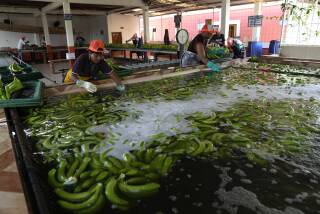Cocaine Vital to Economy, Bolivian Says : Removing Coca Plants Would Stir Upheaval, Envoy to U.S. Declares
- Share via
WASHINGTON — The Bolivian envoy to the United States said today that cocaine production is worth so much to his country’s economy that destroying plants, as the United States has suggested, would cause political and economic upheaval.
Besides, Ambassador Fernando Illanes said, such a program would hit hardest at poor peasants with little chance of earning money from other crops.
He estimated that cocaine exports are worth $600 million a year to his impoverished nation’s economy. Bolivia’s president has said legal exports bring in just $500 million yearly.
Illanes said that even the less ambitious program of raiding cocaine factories--now being carried out with U.S. assistance--will hurt the Bolivian economy.
Bolivia Fed Up
But he said Bolivia “has had it with drugs.”
He told a news conference that the United States had asked his country to try wiping out coca plants, the leaves of which are the main ingredient in cocaine.
But he said that such a program would involve massive disruption in the producing region, a remote jungle and grassland area half the size of Texas.
“When you start attacking large masses of people, you create political problems, you create economic problems and it isn’t that easy to do,” he said.
The only way to destroy coca plants is to root them out because spraying from the air doesn’t work, he said.
Laboratories Targeted
Under the strategy outlined by Illanes, the government is trying to stop drug trafficking by hitting the cocaine-manufacturing plants--the middle of the chain that starts with the coca crop and ends in consumption.
This will drive up the price, reduce consumption and give planters incentive to try turning to other crops, he said.
“The economy definitely will suffer and this has been taken into consideration,” he said.
Illanes also suggested it would be unfair to crack down on the coca growers without massive programs in the United States to stop consumption of cocaine.
“I could also say, why doesn’t the United States go after the consumers?” he said. “Cocaine will be around as long as there are human beings willing to use it, just as cigarettes, alcohol and other drugs.”
In the raids carried out with U.S. assistance, only one of three cocaine factories on the target list has been found so far. (Story on Page 10.) Nevertheless, Illanes said, the raids have been a success because they disrupted the manufacturers’ planning.
More to Read
Sign up for Essential California
The most important California stories and recommendations in your inbox every morning.
You may occasionally receive promotional content from the Los Angeles Times.













